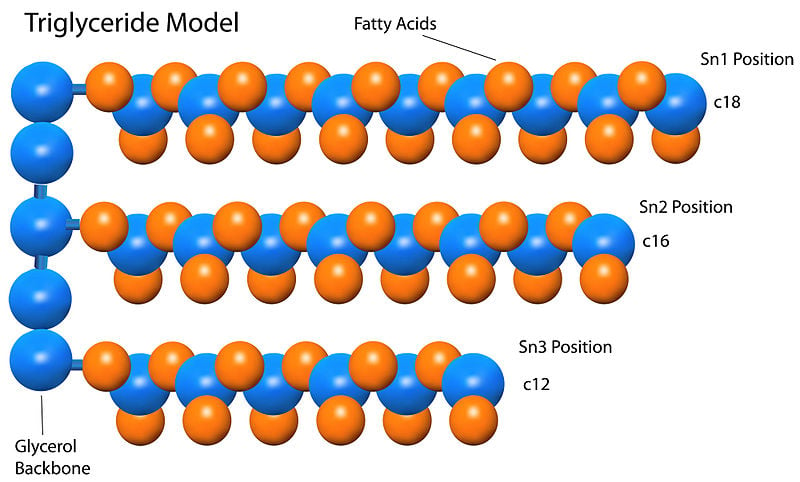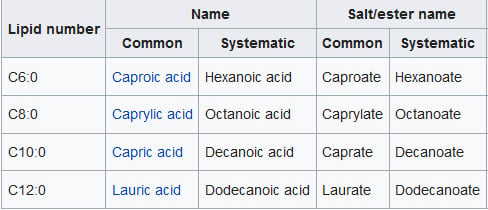My introduction to MCT oil happened many decades ago (I won’t say how many) when I was a pediatrics resident doing my neonatal ICU rotation. MCT oil was used as part of the nutrition for the tiny premature babies who needed to gain weight. Since their digestive system was as immature as they were, it was sometimes necessary to feed them the most elemental foods possible. Some received their fluids, amino acids and vitamins through their intravenous lines. And fat, in the form of MCT oil, was pumped into a tiny feeding tube placed into their stomachs.
Fast forward to the past 10 years or so. Coconut oil has become one of the latest dietary health fads, claimed to have a multitude of health benefits. Coconut oil is rich in MCTs, i.e. medium-chain triglycerides, so the logical next step was to promote MCT oil as a health “superfood” in its own right.
Proponents of MCT claim that it can aid in weight loss, enhance exercise performance, and even help diabetes, digestive disorders, and brain disorders. Is there any scientific evidence to back up these health claims? Let’s check it out.
Table of Contents
What is MCT Oil?
MCT oil is a manufactured product that is produced by hydrolysis of coconut or palm kernel oil. It is made up of medium-chain triglycerides.
A Brief Primer About Triglycerides
 Triglycerides are the main constituents of body fat. Triglycerides all have a backbone of glycerol attached to three fatty acids.
Triglycerides are the main constituents of body fat. Triglycerides all have a backbone of glycerol attached to three fatty acids.
Fatty acids (FA) consist of a carbon-based carboxylic acid with a long aliphatic tail made up of carbon and hydrogen.
Most naturally occurring fatty acids have an unbranched chain of an even number of carbon atoms, from 4 to 28. It is the length of these aliphatic tails that divide FAs into the categories:
Short-chain (SCFA) with 5 carbons or less, Medium-chain (MCFA) with 6-12 carbons, Long-chain (LCFA) with 13-21 carbons and Very-long chain (VLCFA) with 22 or more carbons.
There are several types of triglycerides. Saturated fats are "saturated" with hydrogen — all available places where hydrogen atoms could be bonded to carbon atoms are occupied.
Unsaturated fats have double bonds between some of the carbon atoms, reducing the number of places where hydrogen atoms can bond to carbon atoms.
Medium-chain triglycerides (MCTs), not surprisingly, have MCFAs as their aliphatic tails. There are four types of MCTs:

Most MCT oil preparations contain almost exclusively octanoic and decanoic acid. Natural sources of MCFs include coconut and palm kernel oil, with MCFs making up more than 50% of its fatty acids.
According to Jensen [1], in cow’s milk MCFAs with C6- C10 make up 4-12% of its fatty acids, and C:12 makes up 2-5%. The concentration can vary with the genetics of the cow, the stage of lactation and the feeding regimen.
Compared to triglycerides with mainly saturated, LCFAs, MCT has a lower melting point, smaller molecule size, remains liquid at room temperature, and is less energy-dense (8.4 vs. 9.2 kcal/g) [2].
In general, the digestion and absorption of fatty acids in the intestines is dependent upon their length. Therefore, the absorption of MCTs in the intestines is faster and more efficient than LCTs. When LCFAs enter the small intestine, they stimulate the release of pancreatic enzymes and bile.
This promotes their absorption and packaging into chylomicrons (a lipid transport system). They reach the systemic circulation through the lymphatic system. On the other hand, MCFAs have a very different metabolic pathway in digestion and absorption.
MCFAs don’t stimulate pancreatic lipase and bile and can be absorbed from the small intestinal cells,
They are then transferred directly into the portal vein for transport to the liver for hepatic metabolism [3].
Inside cells, MCFAs are also handled differently than LCFAs. They are more likely to undergo oxidation and, in some ways, act more like glucose than fat. For example, MCFAs able to cross mitochondrial membranes (the coverings of the cell’s powerhouse) without the need for a special enzyme, and once there, are rapidly oxidized.
The rapid oxidation of MCFAs in liver cells can result in excess production of acetyl-CoA (a molecule that participates in many biochemical reactions in protein, carbohydrate, and lipid metabolism).
This can lead to the generation of ketones rather than its conversion into fat. Also, unlike LCFAs, MCFAs do not need to bind to a fatty-acid binding protein, fatty acid transport proteins, or fatty acid translocase (FAT), which affects of a number of regulatory pathways [2].
Because of these characteristics, MCT oil is often used in parenteral (intravenous) nutrition in premature infants and post-surgical patients as well as in patients with pancreatic insufficiency.
Is There any Research?
In PubMed, there are 628 articles dealing with MCT oil. Of these, 36 are review articles and 98 are characterized as clinical trials. On ClinicalTrials.gov, there are 11 studies involving MCT oil. Two are currently recruiting participants.
In comparison, a search of PubMed for coconut oil yielded 2226 articles, of which 72 were reviews and 109 were clinical trials. ClinicalTrials.gov had 16 clinical trials listed.
Do MCT Oils Help Weight Loss or Maintenance?

Several studies have been done with both animal and human subjects looking at the potential effect of MCT oil on weight loss. In general, the studies have focused on 1. energy expenditure (EE) of MCFAs compared to LCFAs, 2. the effect of MCT on fat deposition, and 3. the effect of MCT oil on food intake and satiety.
In animals, MCT feeding results in less weight gain than diets containing the same calories with LCT, and this was associated with decreased fat deposition. Researchers believe that the weight loss is due to the hepatic oxidation of MCFAs leading to increased energy expenditure. [2]
Most human studies have primarily compared the effects of MCT vs LCT in a single-meal or single-day experiment. For example, Scalfi et al [4] examined the thermic effect of MCTs in 6 lean and 6 obese young men after the ingestion of meals which contained either LCTs or MCTs.
Energy expenditure was measured before and for 6 hours after the meal.
Total EE was 48 and 65% greater in lean and obese subjects (respectively) after MCT compared to LCT consumption. Dulloo et al [5] put 8 healthy young men in a respiratory chamber for 24 hours, during which they were fed diets with varying amounts of MCT:LCT.
They found the 24-h EE increased significantly with increasing MCT:LCT ratio.
They concluded that “relatively low-to-moderate intake of MCT (15-30 g per day) as part of the habitual diet may play a role in the control of human body composition by enhancing daily EE.”
A study by White et al [6] found that subjects who consumed a controlled, weight maintenance diet with 40% fat (of either butter and coconut oil- i.e. MCT, OR beef tallow) for 2 weeks had greater EE with MCT than LCT at 7 days, but not at 14 days, suggesting that the effect may be transient.
Studies [7-10] looked at the effect of MCT on body fat composition and/or satiety, with variable results. There are also two review articles that summarized some of these findings. Rego Costa et al [11] reviewed 14 studies conducted between 2000 and 2010.
Six studies showed a decrease in body mass of individuals, with a consequent loss of weight. Only one showed a positive effect on satiation and four showed an increase in EE.
The authors concluded, “the results are inconclusive and there is a need for further controlled studies with standardized amounts of MCT so that its use can become an alternative for obesity nutritional treatment.”
The second review, by Munne and Stonehouse [12], in 2014, was a systematic review and meta-analysis of 13 trials comparing MCTs to LCTs. Compared with LCTs, MCTs decreased body weight, waist circumference, hip circumference, total body fat, total subcutaneous fat, and visceral fat.
It should be noted that, on average, the amount of additional weight lost with MCT was very modest- only about 1 lb. Likewise, the changes in the other parameters were also very modest (less than ½ inch in the waist and hip circumference, standard mean difference -0.46 and -0.55 for subcutaneous and visceral fat, respectively).
The authors also point out that “Many trials lacked sufficient information for a complete quality assessment, and commercial bias was detected. Although heterogeneity was absent, study designs varied with regard to duration, dose, and control of energy intake….
Further research is required by independent research groups using large, well-designed studies to confirm the efficacy of MCT and to determine the dosage needed for the management of healthy body weight and composition."
Bottom line
Although MCT may be better than LCT in diets for weight loss, the results are modest at best. Better designed, larger studies are needed.
Does it Promote Heart Health?
Proponents of MCT for a heart health claim that its use can lower cholesterol, which in turn, could decrease the risk of heart disease. As with MCT oil and weight loss, the research has had mixed results.
A study by St. Onge et al [13] compared the effect of an oil mixture (MCT oil, phytosterols and flaxseed oil) vs. olive oil on plasma lipid concentrations of 24 healthy, overweight men during two periods of 29 days each.
Total cholesterol concentration decreased by 12.5% when subjects consumed the MCT/flaxseed oil mixture vs. 4.7% when they consumed olive oil. Similarly, the oil mixture also lowered LDL cholesterol concentrations by 13.9%, whereas olive oil consumption did not. Of course, since we are dealing with an oil mixture, it is hard to determine what part each component in the mixture contributed to the effect.
The review by Munne mentioned above [12] found no difference in blood lipid levels. Likewise, there were no significant changes in cholesterol levels in patients given MCT oil in the studies by Takechi et al [9] or Cater et al [14].
On the other hand, a study by Greene et al [15] found that subjects fed a liquid-formula diet with 40% MCTs for 6 days, showed a 15% increase in blood triglycerides, and a 15% decrease in HDL levels compared to those given LCTs or a mixture of long and medium-chain triglycerides.
Tholstrup et al [16] found that “compared with fat high in oleic acid, MCT fat unfavorably affected lipid profiles in healthy young men by increasing plasma LDL cholesterol and triacylglycerol.”
Bottom line
There is insufficient evidence to suggest that MCT oil promotes heart health at the present time.
Does it Improve Energy Levels and Mood?
I’ve already mentioned that MCA can improve energy expenditure (see the section on weight above), but I don’t think this is what this question is asking.
I take it as “does MCT oil improve the subjective feeling of having more energy or conferring performance-enhancing benefits?” and “Can it improve my mood?” MCT has been proposed as a means to maximizing an athlete's ability to maintain their glycogen stores so they can be more competitive.
A review by Miriam Clegg found only two studies that have shown an improvement in exercise performance. Unfortunately, only an abstract of this article is available, so I cannot fully review it, but she concludes that:
“Results indicate that MCT feeding is ineffective in improving exercise performance and future work should focus on the health benefits and applications of MCT.”
A 2003 review by Gomes et al [17] on the effect of MCT oil in endurance exercise performance concluded that its use for this purpose remains controversial.
He states: “Currently, however, there is a strong tendency in the literature not to associate MCT supplementation to glycogen sparing effect and performance enhancement.
Except for some few studies that suggested ergogenic benefit from MCT intake, most results show this diet strategy is poorly effective and is not superior to carbohydrate supplementation.”
The most recent research study I found was by Wang et. Al [18]. It was a study done on mice fed either a regular diet or one with MCT oil added.
They were tested on treadmills (did they wear tracksuits?) or a rotating rod. Mice exercised under normal or high-temperature conditions.
They found that mice fed MCT oil performed better under high-temperature conditions than those on a regular diet. There was no significant difference under normal temperature conditions.
There are no studies that look at the effect of MCT oil on mood.
Bottom line
There is little evidence to recommend the use of MCT oil to promote energy or to boost mood.
Does it Support Digestion and Nutrient Absorption?
As I mentioned above, because of its easy digestibility, and its ability to be absorbed directly into the hepatic (liver) circulation, medium-chain triglycerides have been used for many years to treat malnutrition as well as other disorders that hinder nutrient absorption.
MCTs have been used in parenteral (intravenous) nutrition in premature infants and post-surgical patients as well as in patients with pancreatic insufficiency.
Other conditions that may be benefited using medium-chain triglyceride supplements include diarrhea, steatorrhea (fatty stools) and liver and gall bladder disease.
The microbiome is the collection of all the microorganisms living in association with the human body. Microbiome communities consist of a variety of microorganisms including bacteria, viruses, and fungi.
The biggest population of microbes reside in our gastrointestinal tract – our “gut” — mostly in the colon.
The GI microbiome helps us digest our food, produce certain vitamins, regulate our immune system, and keep us healthy by protecting us against disease-causing bacteria.
A few studies have been done to evaluate whether MCT oil can alter the microbiome of the gastrointestinal tract. Unfortunately, they have only been done in animal models. No human studies are available.
Patrone et al [19] looked at the intestinal bacteria of mice fed either a diet that included coconut oil (high in MCT) or soy oil (high in polyunsaturated fats).
Those fed the coconut oil diet had an increased relative abundance of Allobaculum, Anaerofustis, F16, Lactobacillus reuteri and Deltaproteobacteria, and a decreased relative abundance of Akkermansia muciniphila compared to mice fed soy oil.
The researchers also looked at the possible effect of this change of specific bacterial populations on several microbial metabolic pathways. The found that the MCT diet “significantly influenced host lipid metabolism, unlike the [soy oil] diet.”
Patterson et al [20] looked at the impact of dietary fats on the metabolic health status and the intestinal microbiota composition of mice.
Mice were fed high-fat (HF) diets containing either (1) palm oil, (2) olive oil, (3) safflower oil or (4) flaxseed/fish oil for 16 weeks and then compared with mice fed low-fat (LF) diet supplemented with either high maize starch or high sucrose.
They found that dietary palm oil supplementation resulted in significantly lower populations of Bacteroidetes compared to those fed olive oil.
How do these specific changes in gut microbiome translate to humans? We don’t know at the present time.
Bottom Line
MCT oil is useful in clinical situations of malnutrition and certain disorders that hinder nutrient absorption. There are no human studies available to evaluate its role in healthy individuals.
Does it Have Antibacterial, Antiviral and Antifungal Properties?

The argument that MCT oil has an antimicrobial function is based primarily on studies that show that components of MCT oil, such as lauric or capric acids (see above) can inhibit the growth of certain bacteria.
The only studies available are done in vitro (in a test tube) or on animals. There are no human studies.
For example, Nakatsuji et al [21] added lauric acid to cultures of bacteria associated with human acne- Propionibacterium acnes (P. acnes), Staphylococcus aureus (S. aureus), and Staphylococcus epidermidis (S. epidermidis).
Lauric acid was found to inhibit the growth of these bacteria at levels lower than therapeutic levels of benzoyl peroxide (a drug frequently used to treat acne).
They also injected into or applied lauric acid onto the skin of mouse ears colonized with P. acnes. This reduced P. acnes-induced ear swelling and granulomatous inflammation.
Sprong et al [22] took the C10:0 and C12:0 fatty acids and other digestion products obtained from cow’s milk and added them to test tube cultures containing Escherichia coli O157:H7, Salmonella enteritidis, Campylobacter jejuni, Listeria monocytogenes, and Clostridium perfringens.
These MCFAs, as well as milk fat sphingolipids, were found to be effective bactericidal agents, whereas digestion products of phosphoglycerides (a glycerol backbone to which two fatty acid chains and a phosphorylated alcohol are attached) were only moderately bactericidal.
They postulate that milk fat sphingolipids and triglycerides, particularly those containing C10:0 and C12:0 fatty acids, may protect against food-borne gastroenteritis.
Kono et al [23] gave rats a diet containing MCT oil or corn oil for 1 week. Rats were then injected with lipopolysaccharide (LPS). LPS is a potent endotoxin which drives a sudden acute inflammatory reaction which is usually fatal.
All rats given corn oil died after LPS administration; however, this mortality was prevented by MCT in a dose-dependent manner. On autopsy, rats who received MCT oil did not show the liver injury found in those who received corn oil.
MCT oil seemed to blunt the inflammatory reaction in Kupffer cells (specialized macrophages located in the liver).
Unfortunately, you can’t generalize these findings to humans. What happens in a test tube won’t necessarily happen in a human being.
Do the needed digestive products get to where they would need to be? Are they toxic in the necessary doses? Would there be any side effects?
Bottom Line
There is insufficient evidence in humans to prove an antimicrobial effect.
Are MCT Oils Safe?
MCT appears to be safe for most people, however, some minor side effects such as nausea, vomiting, diarrhea, and upset stomach have been reported. As there is no agreed-upon dosage, it might be wise to start slowly, perhaps 1 tsp and increase slowly up to 1-3 tbsp/day.
There has been some concern raised about the use of MCT oil in patients with diabetes due to the accompanying production of ketones. It should also be used with caution in patients with liver cirrhosis. [24]
Conclusions
After a thorough review of the medical literature, we found no compelling evidence for any of the popularly-claimed health benefits of MCT oil as a dietary supplement in healthy individuals. MCT oil can and does play a nutritional role in some specific disease conditions.

Leave a Reply